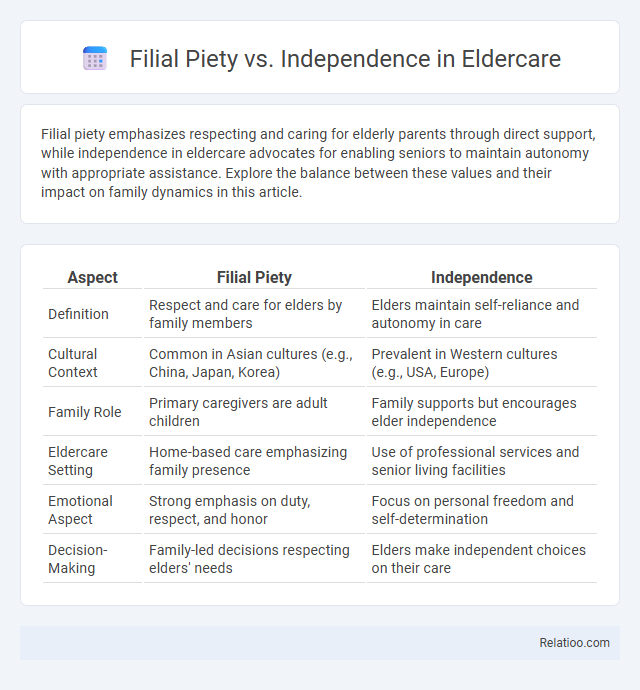Filial piety emphasizes respecting and caring for elderly parents through direct support, while independence in eldercare advocates for enabling seniors to maintain autonomy with appropriate assistance. Explore the balance between these values and their impact on family dynamics in this article.
Table of Comparison
| Aspect | Filial Piety | Independence |
|---|---|---|
| Definition | Respect and care for elders by family members | Elders maintain self-reliance and autonomy in care |
| Cultural Context | Common in Asian cultures (e.g., China, Japan, Korea) | Prevalent in Western cultures (e.g., USA, Europe) |
| Family Role | Primary caregivers are adult children | Family supports but encourages elder independence |
| Eldercare Setting | Home-based care emphasizing family presence | Use of professional services and senior living facilities |
| Emotional Aspect | Strong emphasis on duty, respect, and honor | Focus on personal freedom and self-determination |
| Decision-Making | Family-led decisions respecting elders' needs | Elders make independent choices on their care |
Understanding Filial Piety: Cultural Roots and Modern Relevance
Filial piety, deeply rooted in Confucian values, emphasizes respect, care, and duty towards aging parents, shaping eldercare practices in many Asian societies. Modern relevance highlights a balance between honoring these cultural obligations and promoting independence for elders, ensuring dignity and emotional well-being. Understanding this dynamic is crucial for developing eldercare strategies that respect traditional values while adapting to contemporary needs.
The Rise of Independence in Eldercare: Global Trends
The rise of independence in eldercare reflects a global trend emphasizing self-sufficiency and autonomy for aging populations, contrasting traditional filial piety norms prevalent in Asian cultures. Countries like Japan and South Korea are integrating technology-driven home care solutions and community-based services to support elders living independently. This shift aligns with demographic changes and evolving societal values, promoting dignity and personalized care while balancing familial responsibilities.
Filial Piety vs Independence: Key Differences in Approach
Filial piety emphasizes respect, care, and support provided by adult children to elderly parents, rooted deeply in cultural and familial obligations, contrasting sharply with the independence approach that prioritizes elderly individuals' autonomy and self-reliance in decision-making. Filial piety often involves multigenerational living and direct caregiving, whereas independence in eldercare encourages the use of professional services and promotes aging in place with minimal family intervention. The key difference lies in balancing cultural traditions of familial duty with modern values of personal freedom and quality of life for seniors.
The Impact on Elder Well-being: Comparing Outcomes
Filial piety emphasizes respect and care from adult children, fostering emotional support and cultural continuity that enhance elder well-being, especially in collectivist societies. Independence in eldercare promotes autonomy and self-efficacy, reducing feelings of helplessness and improving mental health and quality of life. Studies indicate that combining filial piety with opportunities for elder independence yields the best outcomes in physical health, psychological resilience, and social engagement.
Family Dynamics: Balancing Tradition and Autonomy
Filial piety emphasizes respecting and caring for elders within the family, often prioritizing tradition and collective responsibility over individual independence. Your family's approach to eldercare can create tension when balancing the elders' desire for autonomy with cultural expectations of duty and support. Understanding and negotiating these dynamics fosters an environment where both tradition and independence coexist harmoniously in eldercare decisions.
Cultural Perspectives: East vs West in Eldercare Values
Filial piety remains a core value in East Asian cultures, emphasizing respect, care, and responsibility for aging parents within multigenerational households. Western cultures prioritize elder independence and autonomy, often supporting aging in place with professional caregiving services to maintain self-reliance. These contrasting cultural perspectives shape eldercare practices, influencing family dynamics, caregiving expectations, and policy development on aging support.
Ethical Dilemmas: Responsibility, Freedom, and Aging
Balancing filial piety and independence in eldercare often creates ethical dilemmas involving responsibility, freedom, and aging. You must navigate respecting elders' autonomy while honoring cultural expectations of family duty and care. Ensuring elders' dignity requires thoughtful decisions that reconcile traditional values with their desire for independence.
Policy and Societal Support: Systems for Eldercare
Filial piety often shapes eldercare policies in East Asian societies, emphasizing family responsibility in providing support, whereas Western policies prioritize independence through formalized eldercare systems like home health services and assisted living facilities. Comprehensive societal support includes government-funded programs, community-based services, and caregiver subsidies to balance family involvement with professional care. Effective eldercare systems integrate cultural values with policy frameworks to enhance quality of life and accessibility for aging populations.
Navigating Transitions: Conversations Between Generations
Navigating transitions in eldercare requires balancing filial piety and independence, where cultural values shape expectations for family involvement and respect for elders' autonomy. Effective conversations between generations foster mutual understanding, ensuring elders' preferences are honored while providing necessary support. Emphasizing empathy and open dialogue helps bridge gaps, facilitating smoother adjustments during aging-related care changes.
Reimagining Eldercare: Integrating Filial Piety and Independence
Reimagining eldercare involves balancing the deep-rooted value of filial piety with the modern need for elder independence, creating a personalized approach that respects cultural traditions while empowering seniors. Your care plan can integrate family involvement and support systems to honor respect and responsibility without compromising autonomy. Leveraging innovative services and technology enhances quality of life, ensuring elders receive compassionate care that aligns with both heritage and contemporary expectations.

Infographic: Filial piety vs Independence in eldercare
 relatioo.com
relatioo.com